The colonisation of Africa was part of a global European process reaching all the continents of the world. European colonisation and domination changed the world dramatically. Historians argue that the rushed imperial conquest of the African continent by the European powers started with King Leopold II of Belgium when he involved European powers to gain recognition in Belgium. The Scramble for Africa took place during the New Imperialism between 1881 and 1914. The focus of this lesson will be on the causes and results of European colonisation of the African continent, with special focus on the Ashanti kingdom (colonised by the British as the Gold Coast, and today the independent African country of Ghana).
European colonisation of Africa in the late 19th century
Africa before European colonisation
Due to worldwide insufficiency of world knowledge, the size and abilities of Africa as a continent was majorly undermined and oversimplified. Before colonisation, Africa was characterised by widespread flexibility in terms of movement, governance, and daily lifestyles. The continent consisted not of closed reproducing entities, equipped with unique unchanging cultures, but of more fluid units that would readily incorporate outsiders into the community with the condition that they accepted its customs, and where the sense of obligation and solidarity went beyond that of the nuclear family. Pre- colonial societies were highly varied, where they were either stateless, run by the state or run by kingdoms. The notion of communalism was accepted and practiced widely; land was held commonly and could not be bought or sold, although other things, such as cattle, were owned individually. In those societies that were not stateless, the chiefs ran the daily affairs of the tribe together with one or more councils. The colonisation of Africa through Europe brought about many forms of government that are still visible today. Before colonisation, however, there were many forms of government in Africa, ranging from powerful empires to decentralised groups of pastoralists and hunters.
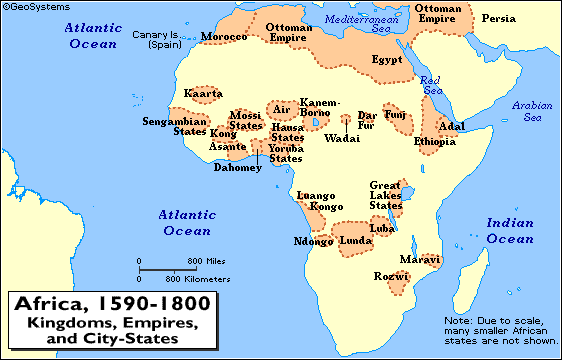 Africa before European colonialism Image source
Africa before European colonialism Image source
The use of iron tools marks a significant turning point in African civilization. Iron tools enhanced weaponry, allowed groups to manage and clear dense and thick forests, plough fields for farming, and making everyday life more convenient. Because the iron tools allowed Africans to flourish in their natural environment, they could live in larger communities which led to the formation of kingdoms and states. With this creation came the formation of modern civilizations, common languages, belief and value systems, art, religion, lifestyle and culture. Another unique characteristic of pre- European Africa was the favouring of oral tradition within these societies. Stories were told and handed down generations in verbal form. This poses a threat to the survival of these stories because certain aspects could be forgotten or told in a different way. National borders were also not much of a concern before colonization. European countries fought over African countries mainly for their natural resources. Lines were drawn through African communities which had existed for many years, and these lines can presently be seen as national borders. “A brief history of European Colonisation in Africa”
Berlin Conference 1884
The Conference of Berlin and British ‘New’ Imperialism, also known as the “Congo conference” began. In 1884 at the request of Portugal, German Chancellor Otto von Bismark called together the major western powers of the world to negotiate questions and end confusion over the control of Africa. The countries represented at the time included Austria-Hungary, Belgium, Denmark, France, Germany, Great Britain, Italy, the Netherlands, Portugal, Russia, Spain, Sweden-Norway (unified from 1814-1905), Turkey, and the United States of America. Of these fourteen nations, France, Germany, Great Britain, and Portugal were the major players in the conference, controlling most of colonial Africa at the time. Britain, France, Germany, Belgium, Italy, Portugal, and Spain were competing for power within European power politics. One way to demonstrate national pre-eminence was through the acquisition of territories around the world, including Africa. Another reason for European interest in Africa is the industrialization when major social problems grew in Europe: unemployment, poverty, homelessness, social displacement from rural areas, etc. These social problems developed partly because not all people could be absorbed by the new capitalist industries. Europe saw the colonization of Africa as an opportunity to acquire a surplus population, thus settler colonies were created. With this invasion, many European countries saw Africa as being available to their disposal. However, several disputes took place regarding which European country would colonise a specific African country. Thus, in 1884, Portugal proposed a conference in which 14 European countrieswould meet in Berlin regarding the division of Africa, without the presence of Africa.
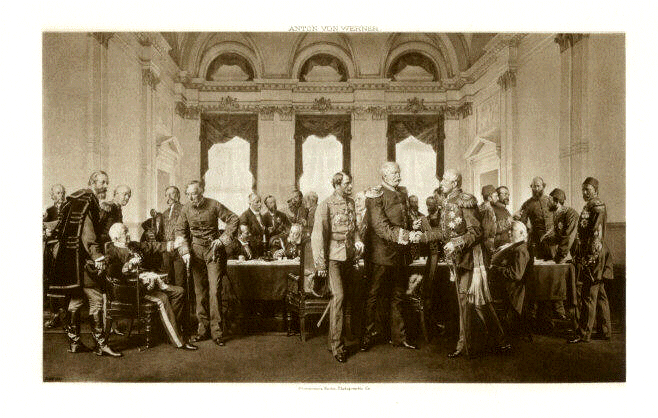 The first meeting at the Berlin Conference, 1884 Image source
The first meeting at the Berlin Conference, 1884 Image source
The initial task of the conference was to agree that the Congo River and Niger River mouths and basins would be considered neutral and open to trade. Despite its neutrality, part of the Kongo Basin became a personal Kingdom (private property) for Belgium’s King Leopold II and under his rule, over half of the region’s population died. At the time of the conference, only the coastal areas of Africa were colonized by the European powers. At the Berlin Conference the European colonial powers scrambled to gain control over the Interior of the Continent. The conference lasted until February 26, 1885 – a three month period where colonial powers haggled over geometric boundaries in the interior of the continent, disregarding the cultural and linguistic boundaries already established by the Native Indigenous African population. What ultimately resulted was a hodgepodge of geometric boundaries that divided Africa into fifty irregular countries.
“The Scramble for Africa and the Berlin Conference”
Causes of colonisation
The reasons for African colonisation were mainly economic, political and religious. During this time of colonisation, an economic depression was occurring in Europe, and powerful countries such as Germany, France, and Great Britain, were losing money. Africa seemed to be out of harm’s way and had an abundance of raw materials from which Europe could make money from. Due to cheap labour of Africans, Europeans easily acquired products like oil, ivory, rubber, palm oil, wood, cotton and gum. These products became of greater significance due to the emergence of the Industrial Revolution. Africa’s colonisation was also as a result of European rivalries, where Britain and France had beenin a dispute since the Hundred Year’s War. These countries became involved in a race to acquire more territory on the African continent, but this race was open to all European countries. Britain had had some success in halting the slave trade around the shores of Africa. But inland the story was different -- Muslim traders from north of the Sahara and on the East Coast still traded inland, and many local chiefs were reluctant to give up the use of slaves.
During the nineteenth century barely a year went by without a European expedition into Africa. The boom in exploration was triggered to a great extent by the creation of the African Association by wealthy Englishmen in 1788, and as they travelled, they started to record details of markets, goods, and resources for the wealthy philanthropists who financed their trips. With the beginning of colonisation in Africa, morality became an increasing issue. The Europeans could not comprehend the existence of the Muslim Swahili trade which made them want to implement the Three C’s: Christianity, Commerce, and Civilisation. First, Europe experienced a Christian revival in the 19th century.
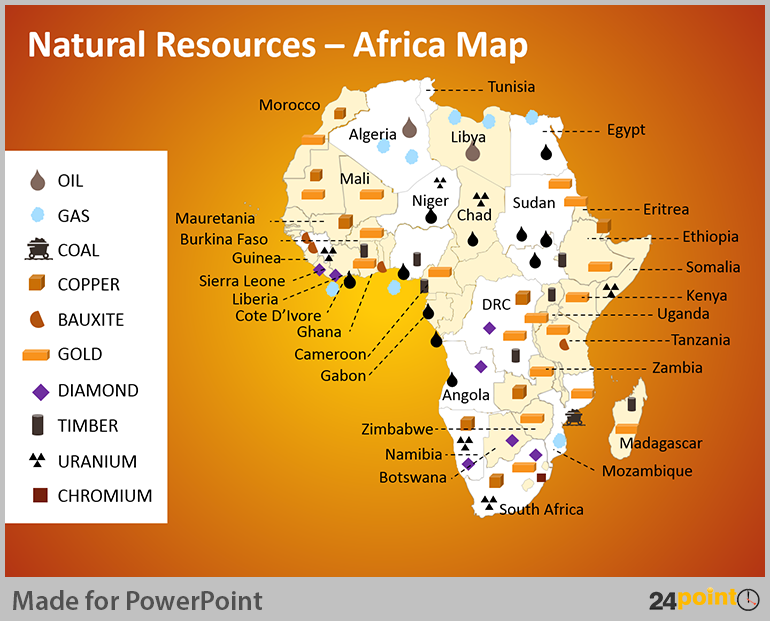 A map of Africa depicting the natural resoures that the continent has. Image source
A map of Africa depicting the natural resoures that the continent has. Image source
Missionaries began to focus on the large working class with the goal of bringing spiritual salvation to the workers and their families. The bible was made available to workers. Due to their large successes, missionaries began to look beyond Europe. Missions were established all over Africa. Missionaries did not serve as direct agents of European imperialism, yet they drew European governments deeper into Africa. In their efforts to preach Christianity, to bring western-style education to Africa and to ingrain monogamy in African societies, missionaries often felt threatened by warfare within Africa. Hence, missionaries called on European governments for protection and intervention. Second, for centuries, European explorers have travelled throughout the African continent in their attempts to discover new things and to chart the African continent.
Trade would be well instantiated; the work of the Suez Canal Company at the north-eastern tip of Africa had been completed in 1869. Lastly, Livingstone believed that civilisation could be achieved through goodgovernment andeducation. The combination of these three elements, Livingstone believed, would end human suffering in Africa, and the ultimate level of civilisation would be achieved within the continent. .Christianity would therefore provide the moral principles that would guide Africans, while education and commerce would encourage Africans to produce their own goods to trade with Europeans. For this to work a functioning and legitimate governing system was needed to ensure the civil rights of the people.
Patterns of colonisation: which countries colonised which parts of Africa
By 1900 a significant part of Africa had been colonized by mainly seven European powers—Britain, France, Germany, Belgium, Spain, Portugal, and Italy. After the conquest of African decentralized and centralized states, the European powers set about establishing colonial state systems. The colonial state was the machinery of administrative domination established to facilitate effective control and exploitation of the colonized societies. Colonial states were authoritarian, bureaucratic systems, partly due to their origins in military conquest and the racist ideology of the imperialist enterprise. The French directed their attention to the active economies of the Niger Delta, the Lagos Hinterland and the Gold Coast.
Why European Countries were able to colonise Africa so quickly
The European countries were able to colonise African countries rapidly because there were rivalries between African leaders. These kings and chiefs were competing with each other to be the richest and most powerful within their tribes. During these rivalries, European leaders would take advantage of the situation and persuaded some leaders to be on their side to fight against other leaders. Natural disasters also played a big role in the rapid and easy colonisation of Africa. In 1895, a serious drought reached many regions in Africa which was caused by a sudden decline in rainfall. Hardly any crops were produced, and the food shortage which followed caused the death of many people and animals. The little crops that were produced were destroyed by a plague of locusts. In addition to this plague, the cattle plague broke outduring the 1890’s which killed cattle, sheep and goats. This led to even more deaths of animals and people, and due to their physical and mental weakness, they were unable to fight against European powers.
European powers could easily take control of any source of land by using force and violence. They accomplished this by using more powerful weapons, and had the advantage of the newly invented machine gun called the Maxim gun which was invented in the 1880’s. This gun could fire eleven bullets per second, and outdid the weapons that the African forces had. African armies did not manage to get hold of European weapons because it was not sold to them. Thus Africans were at a military disadvantage. An outbreak of new diseases made an appearance during the late 1890’sand the first one was a range of smallpox epidemics. The Europeans who were already in Africa had developed immunity to these diseases due to past experiences of these outbreaks in Europe. The indigenous African population had no immunity or resistance to these diseases and thus weakened the African population. A large number of the African population thus died out, or became too weak to fight back.
Results of colonization
The impact that colonisation had on Africa can be described as both good and bad. In terms of European political practice in Africa, all colonising countries share similar attributes. Colonial political systems were un-democratic; Law and Order, as well as Peace, was a primary objective of colonial governments; Colonial governments lacked capacity and Colonial governments practiced "divide and rule." Firstly, colonial governments did not allow popular participation, and all political decisions were made by the small political elite with no or little input from the African population. Secondly, the African population was not satisfied with the way that Europeans imposed on their governing system without any proper representation, thus the maintenance of peace under the African population was made an important priority for the colonial government. Thirdly, seeing as most colonial governments were not rich, they did not fund the governing of their colonies fully. Although they were responsible for raising the money for their own colonies, they still lacked the incometo properly develop and maintain a successful governing system. This meant that colonial governments were not able to provide basic infrastructure, such as roads and communication networks, nor were they able to provide basic social services such as education, health care, and housing. Lastly, the principle of “divide and rule” meant that policies that intentionally weakened indigenous power networks and institutions were implemented.
Due tothe lack of revenue within the colonies, little attention was given to promoting social change or development. Although all the colonies did not experience the same extent of social change, these colonies share the same characteristics in terms of social change. Firstly, colonial and political practices caused a large scale movement of people. In some areas, migrations were primarily from one rural area to another. In other places, the migration was from rural areas to urban areas. These movements resulted in dislocation of peoples that impacted society and culture. Social and cultural beliefs and practices were challenged by these migrations. Long-held practices had to be adapted, and at times were completed abandoned, to fit the new colonial circumstances. Secondly, and partly due to the first consequence, the dislocation of families also occurred. Men mainly left the household to work in mines and on plantations, leaving their wives and children behind. As a result, women and adolescents were forced to take on new roles and to cope in absence of their husbands and fathers. Due to colonialism, the African family structure had been severely changed.
Prior to colonialism, the extended family structure (family that extends beyond the immediate family) was the norm in most African societies, but by the end of colonial era, the nuclear family (family consisting of a pair of adults/ parents and their children) was becoming the norm in many African countries. Thirdly, urbanization emerged as colonization was imposed. During colonialism, urbanization occurred fairly rapidly in many African colonies. A number of pre-colonial African societies had towns and small cities. However, even in these societies, most people were engaged in agriculture in rural villages or homesteads. Urban living resulted in changes in economic activities and occupation, and in changes in the way people lived. These changes often challenged existing values, beliefs, and social practices. Fourthly, the religious beliefs of Africans were adapted or changed. A small percentage of the African population regarded themselves as Christians, and today more than half of the African population is Christians. Colonial rule provided an environment in which Christianity, in many forms, spread in many parts of Africa. While Islam was widespread in Africa prior to the coming of colonialism, it also benefited from colonialism. British and French colonial officials actively discouraged Christian mission work in Muslim areas.
Lastly, the public education system of African was also changed. The majority of colonial governments did little to support schools. Most formal schooling African colonies were a result of the work of missionaries. Missionaries felt that education and schools were essential to their mission. Their primary concern was the conversion of people to Christianity. Missionaries believed that the ability of African peoples to read the Bible in their own language was important to the conversion process. However, most mission societies were not wealthy, and they could not support the number of schools that they really wanted. Consequently, with limited government support, most African children did not go to school during the colonial era. In fact at the end of colonial rule, no colony could state that more than half of their children finished elementary school, and far fewer attended secondary school.
“Colonialism’s impact on Africa”
Case Study: The Ashanti kingdom
The coast of West Africa before the arrival of Europeans
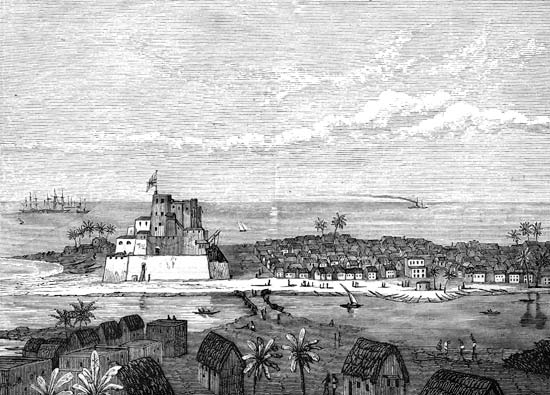 The city of Elmina, located in the Gold Coast West Africa, in the late 19th century. Image source
The city of Elmina, located in the Gold Coast West Africa, in the late 19th century. Image source
West Africans developed an extensive self-contained trading system, based on skilled manufacture. From the 8th century Muslim traders, from North Africa and Arab countries, began to reach the region. Gradually, communities began to convert to Islam. By the end of the 11th century some entire states, and influential individuals in others, were Muslim. At the same time, West African trade slowly expanded towards Egypt and possibly India. Arabic texts mention that from the late 8th century Ghana was considered 'the land of gold'. Mali also possessed great wealth. In 1324-5, when Mansa Musa, its emperor, made a pilgrimage to Mecca, he took so much gold with him that in Egypt, which he also visited, the value of the metal was debased. Prior to the European voyages of exploration in the fifteenth century, African rulers and merchants had established trade links with the Mediterranean world, western Asia, and the Indian Ocean region. Within the continent itself, local exchanges among adjacent peoples fit into a greater framework of long-range trade.
The Ashanti and their early contact with European traders and explorers
The Ashanti kingdom, or Asante, dominated much of the present-day state of Ghana. It was ruled by an ethnic group called the Akan, which in turn was composed of up to 38 subgroups, such as the Bekiai, Adansi, Juabin, Kokofu, Kumasi, Mampon, Nsuta, Nkuwanta, Dadussi, Daniassi, Ofinsu, and Adjitai. Gold Coast began encountering European traders in the mid-1400s, when the Portuguese began trading with coastal peoples. By the seventeenth century, many European trading giants including the British, Dutch and French began building fortifications along the coastline in order to assert their positions. These interactions were to have a profound effect on African coastal settlements and African institutions came under considerable European influence very early on. West Africa had a long history of connection to trans-Saharan gold trade, and from the 15th century was drawn into trade with Europe, in gold and increasingly in slaves. The Ashanti kingdom had emerged from the mid- 17th century, benefitting from access both to rich agricultural resources and gold, much of the labour for production of which was provided by a domestic slave trade.
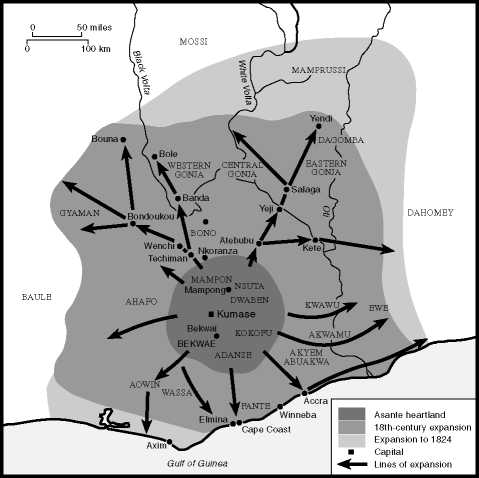 The Expansion of the Asante Kingdom,1700-1807 Image source
The Expansion of the Asante Kingdom,1700-1807 Image source
Many parts of West Africa was still unknown to the rest of the world, thus By the late 15th century and early 16th century many European nations like Portugal started to send the missionaries and explorers to investigate various parts of Africa and West Africa in particular. As early as in the 19th century European powers like France, Germany, and Britain likewise sent number of missionaries, explorers, traders and philanthropists in West Africa. These groups were sent in Africa to investigate the needed knowledge about Africans, their history and culture, mostly knowledge about raw materials, visibility, potential areas and the nature of African population British traders had operated off what was to become known as the “Gold Coast” with little direct intervention by British authorities.
When the Ashanti kingdom showed ambitions to expand its control southwards in negotiating treaties with African authorities and protecting trading interests, the British invaded Ashanti in 1874 and burnt its capital. The majority of European Explorers spent their time to investigate and to detail the interior and coast of West Africa to help European powers that were searching areas with potential materials as European countries were experiencing mushrooming of industries. Explores assisted the European merchant groups; penetration of west Africa interior in 18th century was real a hard and difficult but with the aid of explorers, European merchant groups had advantage of trading in West Africa freely with assurance of security of themselves and their trading commodities.
The British and the colonisation of the Gold Coast
As Britain increasingly colonised more and more African countries, the British had become the dominant power along the coast, and they began annexing and laying claim to territory gradually. The expansion of the Asante kingdom towards the coast was the major cause of this, as the British began to fear that the Asante would come to monopolise coastal trade in their place. The British placed the Governor of neighbouring Sierra Leone, which was already annexed, in charge of British forts and settlements along the coast. He formed an unfavourable opinion of the Asante, and began the long process of attempting to bring them under British control. However, disputes over jurisdiction of the area known as Ashanti led to war between the British and the Asante, and in 1824, the Asante succeeded in killing the Governor as well as seven of his men. In retaliation, the British (with the help of tribes oppressed by the Asante, including the Fante and the Ga) beat the Asante back in 1826, and successfully ended their dominance of coastal regions. The establishment of British law and jurisdiction in the colony was a gradual process, but the 1844 Bond with the Fante is popularly considered to be its true beginning. This recognised the power of British officials and British common law in the Gold Coast and over the Fante people. In 1850, a Governor was appointed to Gold Coast who was not also Governor of Sierra Leone, and this is how the colony of Gold Coast was born. A supreme court was established in 1853, and led to British common law becoming enforced. However, all of this brought financial challenges, and saw the policy of making the colonies pay come in to force in the Gold Coast for the first time.
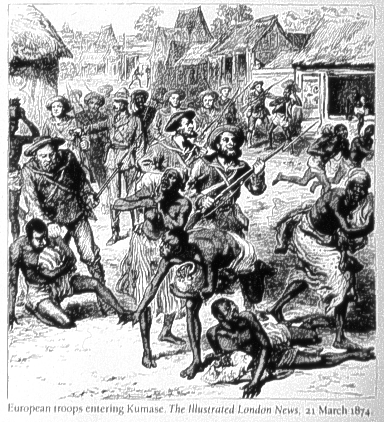 European troops entering Kumane during the second Anglo- Ashanti War. Image source
European troops entering Kumane during the second Anglo- Ashanti War. Image source
The British fought against the Ashanti four times in the 19th century and suppressed a final uprising in 1900 before claiming the region as a colony. The first Anglo-Ashanti War began in 1823 after the Ashanti defeated a small British force under Sir Charles McCarthy and converted his skull into a drinking cup. It ended with a standoff after the British beat an Ashanti army near the coast in 1826. After two generations of relative peace, more violence occurred in 1863 when the Ashanti invaded the British "protectorate" along the coast in retaliation for the refusal of Fanti leaders to return a fugitive slave. The result was another stand-off, but the British took casualties and public opinion at home started to view the Gold Coast as a quagmire. In 1873, the Second Ashanti War began after the British took possession of the remaining Dutch trading posts along the coast, giving British firms a regional monopoly on the trade between Africans and Europe. The Ashanti had long viewed the Dutch as allies, so they invaded the British protectorate along the coast. A British army led by General Wolseley waged a successful campaign against the Ashanti that led to a brief occupation of Kumasi and a "treaty of protection" signed by the Ashantehene (leader) of Ashanti, ending the war in July 1874. This war was covered by a number of news correspondents (including H. M. Stanley) and the "victory" excited the imagination of the European public.
In 1894, the Third Anglo-Ashanti War began following British press reports that a new Ashantehene named Prempeh committed acts of cruelty and barbarism. Strategically, the British used the war to insure their control over the gold fields before the French, who were advancing on all sides, could claim them. In 1896, the British government formally annexed the territories of the Ashanti and the Fanti. In 1900, a final uprising took place when the British governor of Gold Coast (Hodgson) unilaterally attempted to depose the Ashantehene by seizing the symbol of his authority, the Golden Stool. The British were victorious and reoccupied Kumasi permanently. On September 26, 1901 the British created the Crown Colony of Gold Coast. The change in the Gold Coast's status from "protectorate" to "crown colony" meant that relations with the inhabitants of the region were handled by the Colonial Office, rather than the Foreign Office. That implied that the British no longer recognized the Ashanti or the Fanti as having independent governments.
Results of colonisation of the Ashanti kingdom and Britain
In December 1895, Sir Francis Scott left Cape Coast with an expedition force. It arrived in Kumasi in January 1896. The Asantehene directed the Ashanti to not resist. Shortly thereafter, Governor William Maxwell arrived in Kumasi as well. Asantehene Agyeman Prempeh was deposed and arrested. Britain annexed the territories of the Ashanti and the Fanti in 1896, and Ashanti leaders were sent into exile in the Seychelles. The Asante Union was dissolved. Robert Baden-Powell led the British in this campaign. The British formally declared the coastal regions to be the Gold Coast colony. A British Resident was permanently placed in the city, and soon after a British fort.
As a final measure of resistance, the remaining Asante court not exiled to the Seychelles mounted an offensive against the British Residents at the Kumasi Fort. The resistance was led by Yaa Asantewaa, the Queen-Mother of Ejisu. From March 28 to late-September 1900, the Asante and British were engaged in what would become known as the War of the Golden Stool. On March 28, 1900 Governor Frederick Hodgson met with the chiefs at Kumasi and demanded that the Asante hand over the sacred Golden Stool to him. On April 25 the telegraph wires were cut, and Kumasi was surrounded. Thirty British were dying per day in June. On June 23 three officers and 150 made a sortie and managed to escape. Governor Hodgson reached Cape Coast on July 10. The British sent 1,400 troops from other parts of Africa, and the Asante’s nine-month struggle for independence failed. In March 1901 Governor Matthew Nathan visited Kumasi, and he deported 16 Ashanti leaders and imprisoned 31 at Elmina. The people were disarmed, and only licensed hunters could carry guns. The British annexed the Asante confederacy as a Crown Colony and did not allow chiefs to rule in Kumasi until Prempeh became Kumasihene in 1926. In the end, Asantewaa and other Ashanti leaders were also sent to Seychelles to join Prempeh I. In January 1902, Britain finally added Asante to its protectorates on the Gold Coast.
Asante was forcibly incorporated into the British Gold Coast colony in 1902, along with further territory to its immediate north which had not belonged to the kingdom itself. The later addition of British Togoland creates borders for the colony that are essentially those that exist for modern Ghana. When the British defeated the Ashanti people, they collected all the gold treasures of the area. In addition to this, the Ashanti people lost their independence. They did not receive any political rights in the Gold Coast and power was taken away from legitimate Ashanti leaders. People were forced off their land onto farms or factories which ultimately made the British richer. The British then spent money on things that will improve their ability to remove wealth and natural resources from the Gold Coast. They built railroads and roads, but only to their own benefit in order for products to be shipped off to Europe.
